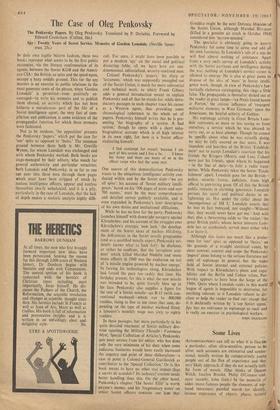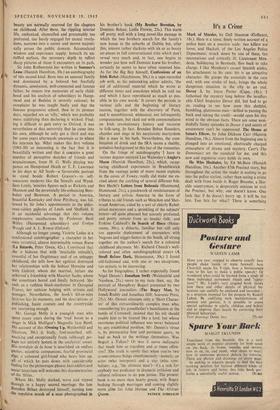Some Lives
-AUTOBIOGRAPHIES can tell us what it is likeittbr a particular, often ultra-sensitive, person to ibe alive; such accounts are existential and cohfes- sional, usually written by comparatively youhg people out of the flux of experience and tHey very'likely approach,-if they do not actually itkb, the form of novels. (One thinks of Minton Welch, Jocelyn Brooke, Philip O'Connor 'and. most recently, John Gale.) In the memoirs of older, more famous people the elements of rur- lured innocence, puzzled search for identity. intense experience of objects, places, natural
beauty are normally reserved for the chapters on childhood. After these, the rippling interior life, embanked, channelled and presumably too profound, too busily engaged for casual revela- tions, narrows into a career and moves majesti- cally across the public domain. Accumulated • wisdom and experience supply. beneath its un- ruffled surface, the necessary depth to reflect sharp pictures of those it encounters on its path.
Sir John Rothenstein has written in Summer's Lease (Hamish Hamilton, 30s.) an autobiography
0 .1 of this second kind. Born into an unusual family
and dominated by a beloved but fearfully dynamic, omniscient, well-connected and famous father, he retains few memories of early Child- hood and his analysis of schooldays in Hamp- stead and at Bedeles is severely rational; he complains he was taught badly and that the famous progressive school, then in its pioneer days, regarded sex as 'silly,' which was probably more stultifying than declaring it wicked. Find- ing it difficult to gain entry to Oxford, it was nevertheless at that university that he came into his own, although he only got a third and was for some years afterwards uncertain as to where his interests lay. What makes this first volume (1901-38) so interesting is the fact that it is beautifully written and that it contains a great number of perceptive sketches of friends and acquaintances, from H. G. Wells playing war games on Hampstead Heath or T. E. Lawrence in his days at All Souls—a favourable portrait to •stand beside Robert Graves's—to self- conscious moderns like the Sitwells and Wynd- ham Lewis, 'nineties figures such as Ricketts and Shannon and the perennially life-enhancing Beer- bohm and Berenson. A period in America, beautiful Kentucky and dour Pittsburg, was fol- lowed by. Sir John's appointments to the alder- man-ridden galleries of Leeds and Sheffield. It is an incidental advantage that this volume supplements recollections by Professor Basil Willey (Hampstead schooldays) and Evelyn Waugh and A. L. Rowse (Oxford).
Although no longer young, Violette Leduc is a confessional autobiographer: a character in her own torrential, almost interminable roman fleuve (La Biitarde, Peter Owen, 42s.). Convinced that she is hideous (but with 'insatiable entrails'), resentful of her illegitimacy and of an unhappy childhood, she tells how her egotism destroyed her relationships with the lesbian Hermine and with Gabriel, whom she married, before she achieved a friendship with Maurice Sachs, whom she sometimes bored and finally betrayed. She ends as a ruthless black-marketeer in Occupied France, her suitcase bulging with sirloins and sausages. Nevertheless, the book's hit-or-miss lyricism has its moments, and the descriptions of Publishing, haute couture and the countryside are interesting enough.
Mr. George Melly is a youngish man who
spent many years during the `trad' boom as a singer in Mick Mulligan's Magnolia Jazz Band. His account of this (Owning Up, Weidenfeld and Nicolson, 30s.) is lively, foul-mouthed, self- mocking and exceptionally frank (although per- haps not entirely honest, in the analytical sense). His nostalgic de la boue is nourished on endless Parties, eccentric companions, fearful provincial digs, a coloured girl-friend who beats him up, all of 'which he puts down with considerable feeling for the picturesque phrase.Jazz addicts and social historians will welcome this documentation of the 'fifties.
Where Mr. Melly ducked, wove and nipped through to a happy second marriage, the late Brendan Behan destroyed himself, turning into the repulsive wreck • of a man photographed in his brother's book (My Brother Brendan, by Dominic Behan; Leslie Frewin, 25s.). This starts off pretty well with a long novel-like passage in
which the two brothers search for the family's new house in the suburbs of Dublin but, after this, interest rather slackens with six or so boozy set-pieces in full conversational trim which don't reveal very much and, in fact, one begins to wonder just how well Dominic knew his brother; certainly he seems to have often resented him.
As for the Big Boy himself, Confessions of an Irish Rebel (Hutchinson, 30s.) is a tape-recorded job with, as his painstaking editor admits, 'the aid of additional material which he wrote at different times and anecdotes which he told me and which I have reproduced as much as pos- sible in his own words.' It covers the periods in various jails and the beginning of literary success, together with the discovery of Paris, and is unembittered, whimsical, not infrequently compassionate, but eked out with commonplaces• on Irish revolutionary history and recourse to folk-song. ln fact, Brendan Behan flounders, chortles and sings in his narcissistic martyrdom like a man in his bath. Nevertheless, the com- bination of drink and the IRA seems a shabby, pointless background to this last of the romantics.
On the fringe of autobiography I have to various degrees enjoyed Leo Walmsley's Angler's Moon (Hamish Hamilton, 25s.), which, recap- turing childhood experiences in Bramblewick from the vantage point of more recent exploits in the coves of Fowey, really did make me ex- cited about the catching of several different fish; Ben Hecht's Letters from Bohemia (Hammond; Hammond, 21s.), a patchwork of reminiscences of literary and artistic America in the form of tributes to old friends such as Mencken and Sher- wood Anderson, aided by a sort of elderly Rabel- aisian mateyness and a sprinkling of the subjects' letters—all quite pleasant but scarcely profound, and pretty remote from us insular folk; and Erskine Caldwell's In Search of Bisco (Heine- mann, 30s.), a didactic, familiar but still only too apposite deployment of encounters with Negroes and nigger-haters in the South, all strung together on the author's search for a coloured childhood playmate. Mr. Richard Church's well- tailored and often autobiographical essays (A Stroll Before Dark, Heinemann, 30s.) I found old-fashioned and, with one or two exceptions, too ecstatic to be interesting.
As for biographies, I rather expectedly found Nigel Dennis's Jonathan Swift (Weidenfeld and Nicolson, 21s.) more to my taste than, say, the portrait of Humphrey Bogart presented by two Hollywood journalists (The Bogey Man, by Jonah Ruddy and Jonathan Hill; Souvenir Press, 25s.). Mr. Dennis attempts only a 'Short Charac-N ter' of this extraordinarily complex man who, remembering his grandfather's humiliation at the hands of Cromwell, insisted that his wit should enable him to be treated like a lord, but whose enormous political influence was never balanced by any established position. Mr. Dennis's virtue is,, by provocative hint and pertinent query, to lead us back to the writings themselves. Was Bogart a Yahoo? Or was it saeva indignatio that made him so truculent and at times offen- sive? The truth is surely that when you're two at-one-remove things simultaneously—namely, an actor (who interprets) and a star (who sym- bolises: e.g., 'the ultimate man')—it's a task for anybody not proficient in dramatic criticism and cultural reference to do you justice. The present book is no more than hearty gossip, with Bogey bashing through marriages and coming slightly more alive for John Huston and The African



































 Previous page
Previous page